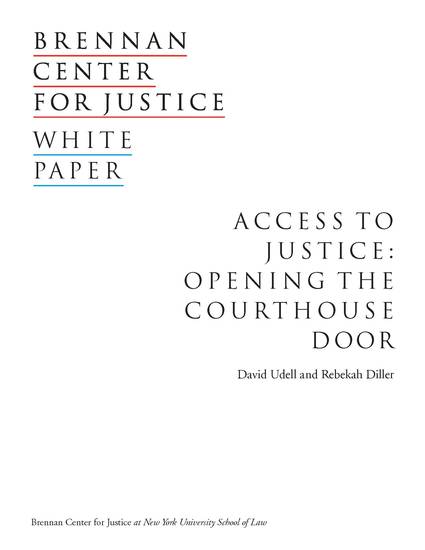
Article
Access to Justice: Opening the Courthouse Door
Brennan Center for Justice
(2007)
Abstract
Our nation’s promise of “equal justice for all” is among its proudest traditions. American courts promise a forum for individuals to settle disputes in a civil manner, under the rule of law. Courts are supposed to ensure predictability so that individuals and businesses can tailor their actions accordingly; contracts, for example, are binding because courts exist to enforce them. In our tripartite system of government, courts act as a check on the ability of the legislative and executive branches to accumulate excessive power. They protect the most vulnerable among us and curb the excesses of majoritarianism. Finally, courts reaffirm the citizenry’s faith in the equal application of the laws and thus in the legitimacy of government in general.
To be sure, resort to the courts is not always a desirable end. Anyone who has ever been involved in litigation is aware of its limitations—the expense, the complexity, the delay, and the ways in which human concerns can be filtered out of the process. Yet, the opportunity to resolve disputes within a court pursuant to the rule of law remains essential in a broad range of matters involving the concerns of low-income individuals. Just as a person with substantial means would never dream of buying a home or seeking a divorce without consulting a lawyer, persons of modest means likewise enter into life-altering transactions for which consultation with counsel is essential. For people of limited financial means, access to an attorney can be the difference between losing a home or keeping it, suffering from domestic violence or finding refuge, languishing in prison or reuniting with family and community. And as decisions related to the War on Terror have demonstrated yet again, the courts can and do function as an essential bulwark of liberty—affording those accused of the worst crimes their only opportunity to establish their innocence and acting as a check on overreaching by the executive branch.
In order for “equal justice for all” to be more than a hollow promise, people require access to the courts that is meaningful, with representation by qualified counsel, the opportunity to physically enter the court and to understand and to participate in the proceedings, and the assurance that their claims will be heard by a fair and capable decision-maker and decided pursuant to the rule of law. In this white paper, we describe how these features of meaningful access to the courts are increasingly absent. We conclude by offering a series of proposals to bridge the gap between the lofty promise of equal justice and the often disappointing reality of justice on the ground.
Disciplines
Publication Date
April 16, 2007
Citation Information
Rebekah Diller. "Access to Justice: Opening the Courthouse Door" Brennan Center for Justice (2007) Available at: http://works.bepress.com/rebekah-diller/32/
